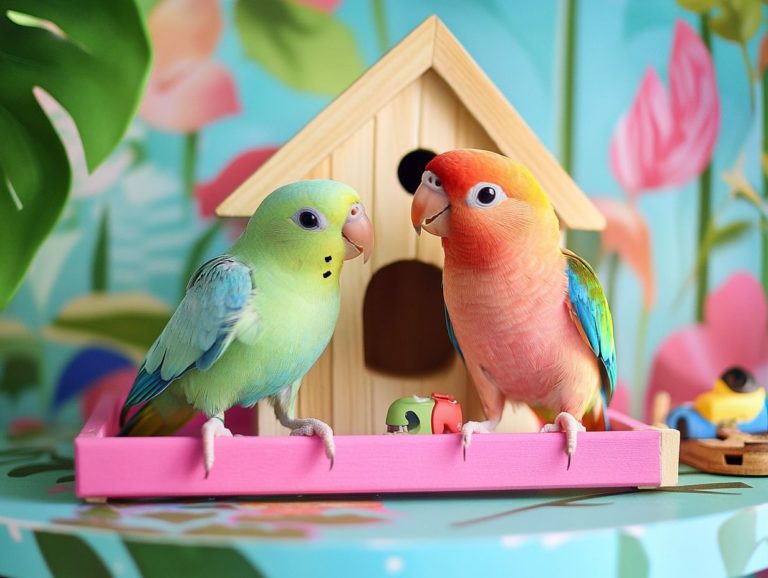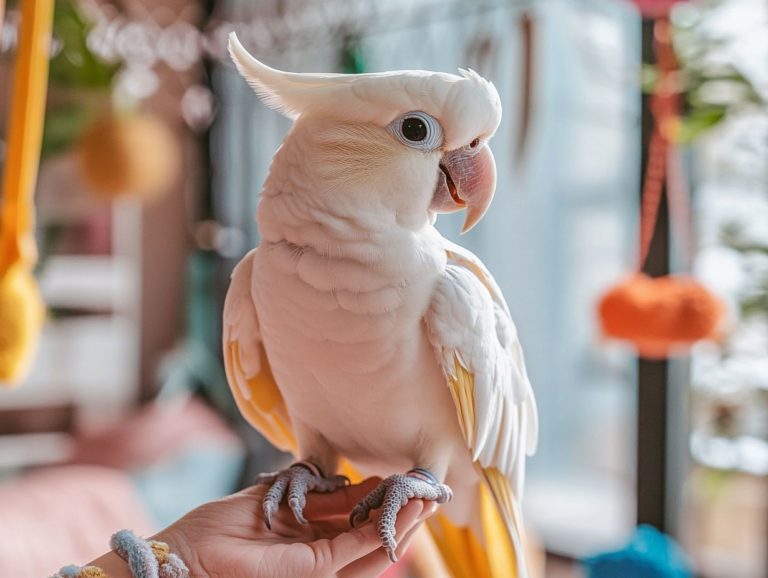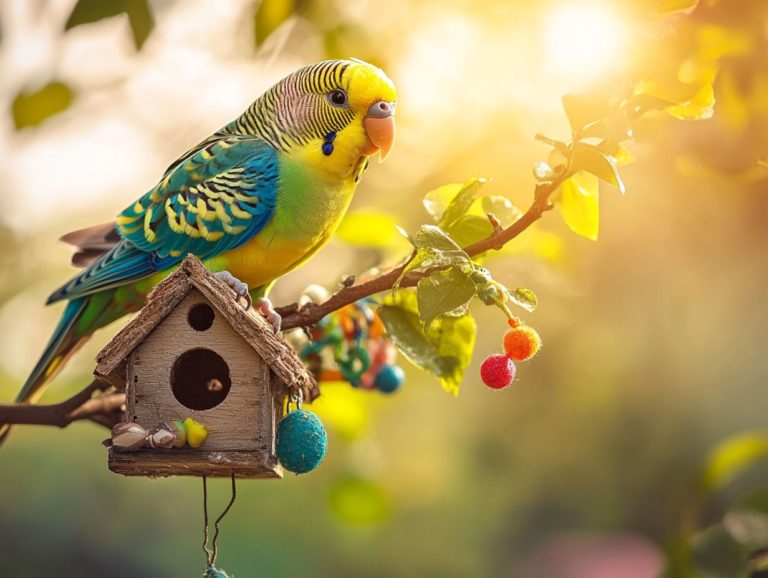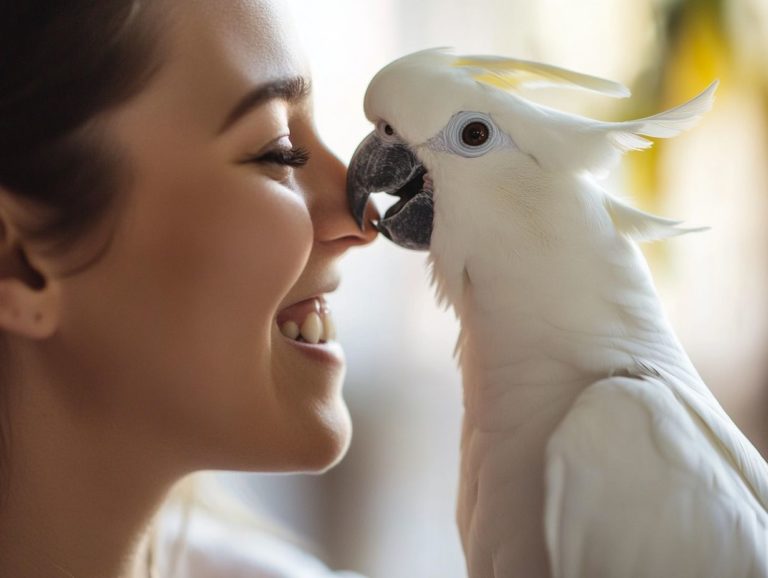5 Best Practices for Budgerigar Health
Caring for a budgie involves much more than simply providing a cozy cage and some seed. These vibrant little birds flourish on a nutritious budgie diet, regular exercise, and ample social interaction, making it essential for you to understand their unique needs.
This guide delves into the five best practices for ensuring your budgie remains both healthy and happy. From establishing a clean budgie habitat to recognizing signs of sickness, you will gain insights into every facet of bird care, empowering you to nurture a joyful and thriving companion.
You ll also find essential tips for selecting the right budgie and avoiding common pitfalls. Are you ready to give your feathered friend the best life ever? Let’s dive right in and discover how the right accessories can boost your budgie’s home environment.
Contents
- Key Takeaways:
- 1. Providing a Nutritious Diet
- 2. Regular Cleaning and Maintenance of the Cage
- 3. Proper Socialization and Exercise
- 4. Monitoring for Signs of Illness
- 5. Regular Vet Check-Ups
- How to Choose the Right Budgerigar for Your Home?
- How Can a Budgerigar’s Environment Affect Its Health?
- What Are Some Common Mistakes to Avoid in Budgerigar Care?
- How Can a Healthy Diet Improve a Budgerigar’s Health?
- What Are Some Additional Tips for Ensuring Budgerigar Health?
- Frequently Asked Questions
- What are the 5 best practices for budgerigar health?
- Why are regular veterinary check-ups important for budgerigar health?
- How does proper nutrition affect budgerigar health?
- Why is a clean living environment important for budgerigar health?
- How can exercise and mental stimulation benefit budgerigar health?
- Why is early detection and treatment of health issues important for budgerigar health?
Key Takeaways:
- Provide a balanced budgie diet for optimal health and longevity.
- Clean and maintain your budgerigar’s cage regularly to prevent disease spread and promote a healthy habitat.
- Socialize and provide exercise opportunities to keep your budgerigar mentally and physically stimulated.
1. Providing a Nutritious Diet
A nutritious diet is crucial for your budgie’s well-being. A balanced intake of minerals, fruits, and vegetables contributes directly to their health.
By understanding the dietary needs of budgies, you can craft a diverse menu that supports their health and activity levels. Budgies have a natural curiosity and love to explore a variety of foods, so it’s vital to offer an array of options that stimulate their appetite and deliver the necessary nutrients they need to thrive.
Plus, high-quality seed mixes specifically designed for budgies, incorporating fresh fruits like apples, pears, and berries, can inject vital vitamins into their diet. Leafy greens such as spinach and kale provide essential minerals. Whole grains are also a fantastic addition, offering texture and fiber. Ensure fresh water is available at all times; keeping them hydrated is key to their overall health.
To keep mealtime engaging, consider rotating different fruits and vegetables, introducing new items regularly to keep things fresh. Special budgie treats can be strategically employed to reward good behavior, enhance your interactions, and provide extra nutrients.
Remember, variety is not just the spice of life for budgies it s the cornerstone of a vibrant, healthy lifestyle.
2. Regular Cleaning and Maintenance of the Cage
Regular cleaning of your budgie’s cage is essential for a healthy habitat. This prevents sickness and ensures a comfortable living environment for your feathered companion.
To keep your vibrant pet in top shape, aim to clean the cage at least once a week. This involves scrubbing the bottom tray, wiping down the bars, and refreshing the bedding materials.
Regarding cleaning supplies, choose mild, bird-safe detergents, steering clear of harsh chemicals that could harm your budgie. Don t forget to clean feeding dishes and perches daily to ward off harmful bacteria and mold.
By prioritizing hygiene in your budgie s space, you significantly reduce the risk of infections and foster a thriving, invigorating environment for your beloved bird.
3. Proper Socialization and Exercise
Proper socialization and exercise are vital for your budgie s mental health and physical well-being. These activities offer the stimulation and companionship that significantly enhance their quality of life.
When you engage with your budgie through gentle handling and conversation, you can dramatically boost their confidence and trust in you. Consider introducing them to other pets, like friendly dogs or cats. This can spark curiosity and help develop their social skills, as long as you supervise the interactions to ensure everyone stays safe.
It’s essential to provide a variety of toys think swings, mirrors, and chewable items to keep your budgie mentally stimulated. Regular playtime encourages physical activity, mimicking their natural behaviors. Additionally, dedicate some time to training sessions, where you teach your budgie new tricks or commands using rewarding them for good behavior. Not only does this strengthen the bond between you and your budgie, but it also promotes mental agility and overall happiness.
4. Monitoring for Signs of Illness
Monitoring your budgie for signs of illness is essential for early detection. This empowers you to take swift action to safeguard your beloved companion’s health.
Watch for common symptoms, like noticeable changes in behavior. If your little friend seems more lethargic or shows unexpected aggression, take note.
Pay attention to their appetite too. Eating less or suddenly favoring specific foods could signal a red flag.
Changes in droppings could indicate gastrointestinal issues, so don t overlook them.
Regular health checks help you spot these signs early. If you notice sudden weight loss or breathing struggles, consult a veterinarian right away.
These signals mean professional help is crucial for your feathered friend s well-being.
5. Regular Vet Check-Ups
Regular vet check-ups for your budgie are essential for ensuring its health and well-being. They provide opportunities for early intervention and expert guidance on proper care practices, including ways to enhance your bird’s mental health.
It is advisable to schedule a veterinary visit at least once a year. If you have an older bird or one with specific health concerns, more frequent visits may be necessary.
During these check-ups, the vet will perform a comprehensive examination, assessing the feathers, beak, and overall body condition while also observing any behavioral changes.
Common vaccinations may include those for psittacosis a disease that can affect birds and avian pox. Recommended treatments could involve dietary adjustments or medications for parasitic infections.
Building a solid relationship with an avian veterinarian boosts your budgie’s quality of life. It also equips you with a trusted partner to navigate any health issues that may arise.
How to Choose the Right Budgerigar for Your Home?
Choosing the perfect budgerigar for your home involves thoughtful consideration of several factors. These include the ideal cage size, compatibility with other pets, and the specific needs of these charming beginner companions.
As you explore different budgie breeds, you might come across English Budgerigars, recognized for their larger size and gentle nature. You will also find American Budgerigars, known for their striking colors and playful personalities.
When selecting your feathered friend, pay attention to traits like sociability, curiosity, and resilience. These characteristics often signal a healthy and happy bird.
To craft a welcoming budgie habitat, choose a spacious cage outfitted with:
- Budgie perches
- Toys for mental stimulation
- Safe food and water containers
Enhancing their environment with accessories like a cozy nest and appropriate lighting can transform it into a vibrant home for your new companion.
What Are the Common Health Issues in Budgerigars?
Budgerigars, like any cherished pet, can encounter various common health issues. These include respiratory problems, feather plucking, and nutritional deficiencies.
These charming birds may show signs like wheezing, feather loss, or changes in eating habits. These are red flags that could indicate underlying health concerns.
Treatment options will differ based on the issue. You might need antibiotics for a respiratory infection or behavioral therapy to address feather plucking.
Taking preventive measures is crucial for maintaining optimal health. Provide a balanced diet rich in vitamins and regularly clean their habitat.
Regularly monitoring their well-being and scheduling veterinary check-ups are essential strategies for catching potential problems early. This ensures your delightful companions enjoy long, healthy lives.
How Can a Budgerigar’s Environment Affect Its Health?
The environment you create for your budgerigar significantly impacts its overall health. Factors like cage size, cleanliness, and the availability of stimulating toys play a crucial role in influencing your bird s well-being and behavior.
An appropriately sized cage is essential. It provides enough space for flying and perching, ensuring your budgie feels secure and comfortable. Ideally, the cage should allow your bird to stretch its wings fully and move around freely without constraints.
The type of perches you choose is equally vital. Incorporating various diameters and materials maintains foot health and prevents boredom. Strategically placing toys that capture your bird s natural curiosity fosters a stimulating atmosphere.
When you consider these elements thoughtfully, you enhance your budgie’s physical vitality and minimize stress. This encourages playful and sociable behaviors, which are hallmarks of a happy and healthy pet!
What Are Some Common Mistakes to Avoid in Budgerigar Care?
As a new pet parent, it’s easy to fall into common pitfalls when caring for a budgerigar. These include overlooking the importance of a varied diet, neglecting cleaning cage maintenance, or skimping on socialization. To avoid these issues, consider following 5 quick tips for feeding your bird, as such missteps can significantly impact your budgie’s health and happiness.
Remember, a budgie’s diet shouldn’t consist solely of seeds. Adding fresh fruits and vegetables can enhance their nutritional intake and overall well-being.
Regularly cleaning the cage is essential. Changing bedding and removing waste helps maintain a healthy environment for your feathered friend.
Don’t underestimate the power of social interaction! Budgies are social creatures that thrive on frequent, positive engagement with you or their fellow birds.
By being mindful of these common mistakes, you can create a lively, caring home that ensures your budgie leads a happy and fulfilling life, especially if you consider adding an aviary for more space and stimulation.
How Can a Healthy Diet Improve a Budgerigar’s Health?
A healthy diet profoundly impacts your budgerigar’s well-being, enhancing its vitality, plumage quality, and overall energy levels. This can lead to a longer, happier life. You can greatly benefit your feathered friend by understanding essential care tips for newly adopted birds and incorporating basic pet care knowledge into your routine.
A balanced diet plays a crucial role in boosting immune function, which is how your budgie’s body fights off sickness. By introducing a delightful variety of fresh fruits, vegetables, and high-quality seeds, you can ensure your feathered friend receives essential vitamins and nutrients.
When making dietary changes, introduce them gradually. Start by adding small amounts of new foods alongside their regular diet. This approach helps your budgie adjust and encourages adventurous eating habits, leading to a healthier bird, particularly when you consider training budgies for better acceptance of new items.
What Are Some Additional Tips for Ensuring Budgerigar Health?
Ensuring your budgerigar’s health requires a dedicated approach to care, including proper nutrition, regular exercise, and awareness of common health issues in budgerigars to create a safe, engaging habitat.
Selecting the right budgie toys can stimulate their minds and keep them active, encouraging natural behaviors that are vital for their happiness.
Maintaining social interaction, whether through regular playtime or companionship with another budgie, is crucial to prevent loneliness and foster a joyful environment!
Additionally, safeguarding against potential environmental hazards like drafts, toxic plants, or unsafe cleaning products is key to providing a secure living space, especially when housing multiple aviary birds.
When you integrate these practical tips, you cultivate a holistic approach to budgie care, ensuring a vibrant and fulfilling life for your feathered companion. For those with eclectus parrots, exploring essential care tips can also enhance their well-being.
Frequently Asked Questions
For more information on budgerigar care, visit your veterinarian for regular check-ups and try introducing new foods into their diet. Your budgie will thrive with a little extra care!
What are the 5 best practices for budgerigar health?
- Regular veterinary check-ups
- Proper nutrition
- Clean living environment
- Exercise and mental stimulation
- Early detection and treatment of health issues
Why are regular veterinary check-ups important for budgerigar health?
Regular veterinary check-ups are vital for budgerigar health. They help catch potential health issues early, which is important for their well-being, along with following guidelines on how to keep your bird healthy and happy.
How does proper nutrition affect budgerigar health?
Proper nutrition is essential for good budgerigar health. A balanced diet should include high-quality seeds, fresh fruits, and vegetables, along with preventative care tips for your pet bird to ensure their overall well-being.
Why is a clean living environment important for budgerigar health?
A clean living space is vital for a happy budgerigar! These birds are sensitive to dust, pollutants, and bacteria.
How can exercise and mental stimulation benefit budgerigar health?
Exercise and mental stimulation are key for budgerigar health. Providing toys and opportunities for flying, along with incorporating superfoods for a healthier bird, keeps them active and happy.
Why is early detection and treatment of health issues important for budgerigar health?
Acting quickly on health issues can save your budgerigar’s life. These birds often hide their illnesses, so stay vigilant! Additionally, if you’re considering expanding your avian family, check out these tips for caring for your first cockatiel.





